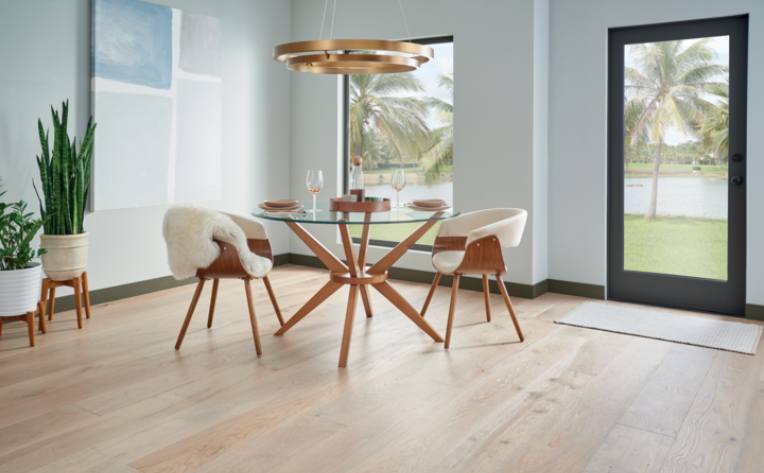Nov 20, 2024 | Flooring America

Choosing hard surface flooring can feel like picking out the perfect pair of shoes—it’s all about finding what fits best for you and your home. From the classic charm and durability of white oak hardwood to the versatility of luxury vinyl that captures the natural beauty of real wood, there’s plenty to consider. It’s like a treasure trove of options, but sometimes it can feel overwhelming, right?
You might wonder about the differences between solid hardwood, a single piece of wood offering timeless reliability, and engineered hardwood, crafted with layers for added stability in changing climates. Understanding these distinctions helps you choose what works best for your lifestyle and taste. We’re here to guide you through these choices, offering quality you can trust so you make your house feel even more like home.
Hardwood flooring is a great way to add timeless allure and elegance to any room, enhancing both style and value. When choosing between engineered and solid hardwood, several factors must be considered. Solid hardwood flooring is a single, solid piece of wood without layers, offering a classic look that can be sanded and refinished multiple times, which makes it perfect for high-traffic areas. On the other hand, An engineered wood floor is crafted from layers of both hardwood and plywood, making it more resistant to moisture and temperature changes, which is ideal for basements or areas with fluctuating climates. Both options provide durability and charm, but your choice will depend on your specific needs and the environment in which it will be installed.
Engineered hardwood flooring is a versatile and stylish choice for any home, offering numerous benefits that make it a top pick for homeowners. Here's why you should consider it:
Engineered hardwood enhances the beauty of any room and provides a durable, eye-catching statement that can withstand daily wear and tear. With its adaptability and style options, it's no wonder engineered hardwood is a preferred flooring option for many homeowners.
 1.jpg?rnd=9420)
Engineered flooring is typically between 3/8” to 3/4” thick, whereas solid hardwood is 1/2” to 3/4“ thick.
Depending on the thickness of the veneer that tops the flooring, the quality of flooring used, and how well you maintain your floors, engineered hardwood typically lasts between 20 and 30 years. All three factors play a significant role in determining the longevity of any floor in your home.
Due to innovative manufacturing techniques, engineered hardwood can be installed in any room in your home, including your basement and bathrooms, as long as there are no extreme moisture issues and a protective moisture barrier is installed.
Because they do have a top layer of hardwood, like solid hardwood, they are susceptible to scratches. If scratch resistance is essential to you, look for engineered hardwood floors with a scratch-resistant top coat. Minor scratches on engineered hardwood can be repaired with a wax repair kit or a cotton cloth and some rubbing alcohol.
While engineered hardwood may look similar to laminate flooring, they are different. Engineered hardwood uses real natural wood in its construction. In contrast, laminate flooring features a photographic layer that replicates the appearance of wood, protected by a clear wear layer, but lacks any real wood content. Additionally, laminate flooring is typically thinner than engineered hardwood, which can impact the feel underfoot and the acoustics in a room.
 3.jpg?rnd=9536)
If you appreciate the timeless beauty of hardwood flooring but require something more durable, engineered hardwood might be the perfect choice for you. Regardless of your design preferences, engineered hardwood offers a wide range of styles, colors, and sizes. To explore options for your home or business, visit your local Flooring America or contact us to learn more about engineered hardwood flooring!